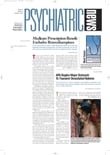A Texas appeals court last month ordered a new trial for Andrea Yates because of inaccurate testimony by a renowned forensic psychiatrist. Yates was found guilty of murder in 2002 for drowning her five children after a jury rejected her insanity plea.
Yates, who was sentenced to life in prison, had petitioned for a mistrial after her conviction but before the penalty phase of her trial after forensic psychiatrist Park Dietz, M.D., Ph.D., informed the prosecution—who then notified the defense—that he had given incorrect testimony as an expert witness for the prosecution.
The trial court rejected Yates's motion for a mistrial, but its ruling was overturned by the Court of Appeals for the 1st District of Texas, which on January 6 ordered a new trial.
The Texas standard for a verdict of not guilty by reason of insanity hinges on whether the defendant knows that his or her behavior was wrong. The jury had agreed with the prosecution's argument, reinforced by Dietz in his expert testimony, that Yates was seriously mentally ill, but knew right from wrong when she drowned her children in a bathtub. (The state charged her with the murders of three of her five children, reserving the right to try her later for the other two.)
TV Show Played Crucial Part
The inaccurate testimony by Dietz, who was the prosecution's only mental health expert, involved statements linked to his work as a consultant to the television show “Law & Order.”
During cross-examination by a defense attorney, Dietz said that he had consulted on an episode that concerned “a woman with postpartum depression who drowned her children in a bathtub and was found insane, and it was aired shortly before the [Yates murders] occurred.”
In a later cross-examination of defense mental health expert Lucy Puryear, M.D., the prosecutor referred to the “Law & Order” episode that Dietz had cited, asking Puryear if she would have questioned Yates about the episode had she known that Yates regularly watched the show. Puryear testified that if she had known Yates often watched the show—which Yates had acknowledged doing—she would in fact have asked her about the episode in question.
The appeals court decision points out that Yates's attorney had referred to Dietz's testimony in his final argument, stating, “Or maybe even we heard some evidence that she saw some show on TV and knew she could drown her children and get away with it.”
The prosecutor also referenced Dietz's testimony in his final argument, declaring “these thoughts came to her, and she watches `Law & Order' regularly, she sees this program. There is a way out. She tells that to Dr. Dietz. A way out.”
On March 14, 2002, after Yates was convicted of murder but before the sentencing phase, Dietz informed the Harris County district attorney's office that he had given an incorrect answer during cross-examination. He said that after the “Law & Order” producers conducted a search of the show's 269 episodes, they told him that they could find none in which a woman with postpartum depression had drowned her children in a bathtub.
Dietz explained that he was “confounding the facts of three filicide cases” on which he had worked (those involving Susan Smith, Amy Grossberg, and Melissa Drexler) and two “Law & Order” episodes on which he had consulted “that were based in part on those cases.” In one, he acknowledged, “the woman did not drown her child, but smothered it,” but that episode did not air shortly before Yates had killed her children.
In the other filicide-related episode Dietz cited, he said that “it was unclear whether the baby had been killed by the mother or the father and whether it was stillborn or smothered.”
Dietz also said he does not believe “that watching `Law & Order' played any causal role in Mrs. Yates's drowning of her children.”
In a press statement issued the day the appeals court ordered a new trial, Dietz said, “I made an honest mistake and took immediate action to correct it.... I take with utmost seriousness the importance of an expert witness thoroughly preparing for trial and giving absolutely honest testimony as accurately as possible.”
This acknowledgment by Dietz that he had given incorrect testimony was a key basis for Yates's mistrial request, with her attorneys contending that Dietz's testimony was compelling and thus crucial to the jury's decision that she was guilty of murder and not insane.
Though the state maintained that Dietz's testimony about the “Law& Order” episode “was not material,” the appeals court agreed with Yates, finding that “the State used Dr. Dietz's false testimony to suggest to the jury that [Yates] patterned her actions after that `Law & Order' episode.” The court emphasized that the prosecution's use of the false testimony did not equate to “prosecutorial misconduct” but did “give weight to that testimony.”
The appeals court also stated that while Dietz “did not suggest that [Yates] used the plot of the show to plan killing her children... the State did in its closing argument.” His testimony, the court decided,“ was critical” to building the state's case, since he was the only expert witness for the prosecution, while the defense provided testimony of five mental health experts who said that Yates did not know right from wrong when she drowned her children.
Details `Misremembered'
In an interview with Psychiatric News, Dietz expressed dismay at the “mischaracterizations” of his testimony and his correction of it that have flooded the popular press. He emphasized that he did not testify about “nonexistent episodes” of “Law & Order,” but after reading scores of scripts for the show and watching nearly 300 episodes, he “misremembered” and “confounded” details of some of the episodes.
“On cross-examination,” he said, “I made a mistake about one aspect of the show, but not about Mrs. Yates.”
Dietz said he was “angry to be unfairly accused” when he had made “an honest mistake and moved very quickly to correct it.”
“I have always tried to represent psychiatry well in this role of helping triers of fact get to the truth,” he said, adding that “to the extent that this may have embarrassed my subspecialty, I feel horrible.”
The appeals court's decision in Andrea Pia Yates v. State of Texas is posted online at<www.1stcoa.courts.state.tx.us/opinions/htmlopinion.asp?OpinionId=81309>.
[Andrea Pia Yates v. The State of Texas, NOS. 01-02-00462-CR 01-02-00463-CR] ▪

